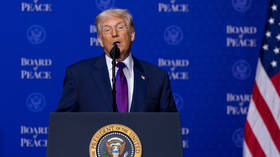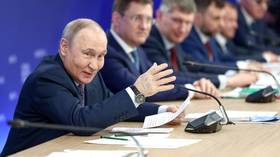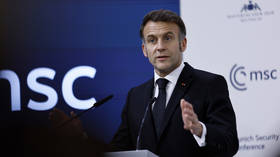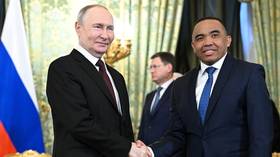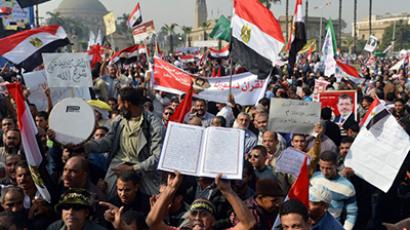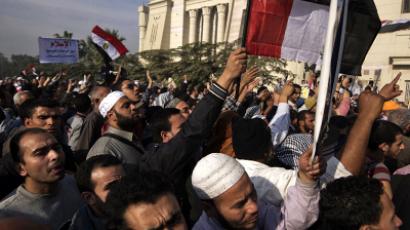Anti-Morsi protesters break through wired fences of presidential palace, injuries reported
Several guards have been injured after protesters broke through barbed wire around the presidential palace in Cairo. Tens of thousands have come to the palace to slam Egyptian President Mohamed Morsi’s bid for absolute power.
Friday again saw thousands marching towards the presidential palace in Cairo, while hundreds others rallied in the iconic Tahrir Square. The demonstrations were called by opposition forces, which include various leftist, liberal and democratic groups.“We want to see the fall of the regime,” chanted the crowd venting their anger with President Morsi, the drafted constitution and the Muslim Brotherhood.The palace has grown surrounded with barbed wire fences and concrete blocks. Police, national guard troops and military are guarding the place, including the tanks brought in Thursday.The protesters rallied peacefully for several hours, but as night fell some began attempting to remove the barbed wire. RT’s reporter Bel Trew watched the crowd remove the barricades and flood the streets around the presidential palace. There, the demonstratots climbed onto army tanks waving flags and chanting slogans against President Mors. Others tried to get over the gate or remove the barbed wire.Protesters told Trew that the Republican Guards “just stepped aside and let people pass.” The guards are currently standing next to their tanks and other posts, but not getting involved with the protest.“At the moment the mood here is more jubilant than violent. People are dancing and singing, there’s a lot of drum beats and football chants,” Trew says, adding that the protesters are set to spend the night rallying right in front of the palace.At the same time, Muslim Brotherhood supporters are gathering in an area near the palace, Trew reports via Twitter. If the two camps meet, it could bring a repeat of Wednesday's violence, when at least six were killed and hundreds injured after Brotherhood supporters drove out opposition crowds camped outside the palace.
Morsi's Muslim Brotherhood Friday once again slammed the opposition’s attempts “to stall the democratic transition.” In its Twitter feed, Egypt’s most influential religious movement called on the nation to rule the country by ballot on the constitutional referendum which is set for December 15.
Calls to storm presidential palace by irresponsible opposition after rejecting dialogue and resorting to violence are dangerous turn
— Ikhwanweb (@Ikhwanweb) December 7, 2012
Constitutional referendum might be postponed – officials
On Friday, Justice Minister Ahmed Mekki said the constitutional referendum might get rescheduled. “The president is ready to talk with political figures without any preconditions. He is open to the idea of postponing the referendum to reach a consensus over the contentious articles. He is ready for that, even if it means the constitution will return to the assembly,” Mekki said.The Election Committee has already agreed to postpone the voting of Egyptians abroad, which was due to start on Saturday, to Wednesday, report local media.However, opposition groups have said their principal position is not to engage in dialogues with Morsi until he rescinds his November decree which granted him powers "worthy of Hosi Mubarak's era."
Tensions spreading nationwide
Clashes flared between Morsi supporters and opponents outside his house in the town of al-Zagazig, northeast of the capital. Security forces deployed tear gas as dozens of angry demonstrators threw rocks at the president’s house. The standoff in the capital of Sharqiya province comes after police evacuated the Morsi family from their house on Thursday amidst fierce fighting.Fighting was also reported in the northern city of Kafr El-Sheikh, around 150 kilometers (62 miles) from Cairo, as well as in the towns of Mansoura and Tanta. In Kafr El-Sheikh, four people were reportedly injured after about 1,000 opposition protesters attempted to attack the local Muslim Brotherhood headquarters and were confronted by some 200 Brotherhood supporters.Similar clashes were also reported in the coastal province of Beheira, where 16 people were injured in scuffles between oppositon groups and the Muslim Brotherhood supporters.
Recent unrest in Egypt stems on Morsi’s November 22 decree, in which he granted himself near-absolute powers, including immunity from judicial oversight of his decisions. Morsi has been pushing for a constitutional referendum in December despite the opposition’s outspoken criticism of the document, which under the Muslim Brotherhood and Salafists's pressure is designed to keep “the principles of sharia” law as the main source of legislation.This week the situation grew extremely volatile in Cairo as massive clashes outside the presidential palace grew deadly. Thursday, the military put tanks outside the palace and 3pm curfew was proclaimed. Even so, hundreds of people streamed into the streets at nightfall, some of them demanding Morsi’s November decrees be retracted, others thrusting their support behind the Egyptian leaders – and many others still just protesting the recent deaths.Soon after that President Morsi addressed the nation accusing the foreign-funded opposition of trying to incite violence against his legitimacy. "I separate the legitimate opposition from the vandals who committed violence,” said Morsi. “The opposition thinks Article 6 is a problem. I won’t insist on keeping it, and anyway, the decree ends after the referendum.”The president called for a Saturday meeting with the opposition to defuse the crisis, but the April 6 group, a leading Egyptian pro-democracy movement which was in the forefront of the revolt against Hosni Mubarak, rejected the call for dialogue, saying it would continue protests against the president.


